- Ilisagvik College provides quality post-secondary academic, vocational and technical education in a learning environment that perpetuates and strengthens Inupiat culture, values and traditions. It is dedicated to providing well educated and trained individuals who meet the human resource needs of North Slope Employers.
School Highlights
Ilisagvik College serves 646 students (11% of students are full-time).
The college's student:teacher ratio of 8:1 is lower than the state community college average of 13:1.
Minority enrollment is 92% of the student body (majority American), which is more than the state average of 63%.
Quick Stats (2025)
- Enrollment: 646 students
- In-state tuition: $3,340
- Out-state tuition: $3,340
- Student:teacher ratio: 8:1
- Minority enrollment: 92%
- Source: Verified school update
Top Rankings
Ilisagvik College ranks among the top 20% of public schools in Alaska for:
Category
Attribute
School Overview
The teacher population of 85 teachers has stayed relatively flat over five years.
Ilisagvik College
(AK) Community College Avg.
Carnegie Classification
Tribal Colleges
Not applicable, not in Carnegie universe (not accredited or nondegree-granting)
Institution Level
Less than 2 yrs
Four or more years
Institution Control
Public
Private not-for-profit
Total Faculty
85 staff
85 staff
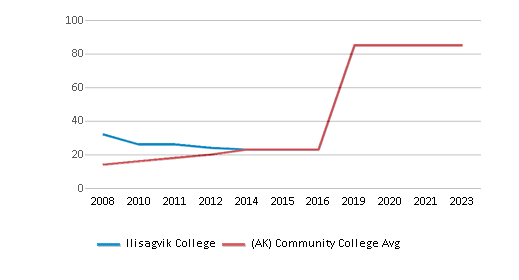
School Calendar
Student Body
The student population of Ilisagvik College has grown by 177% over five years.
The student:teacher ratio of 8:1 has increased from 3:1 over five years.
The Ilisagvik College diversity score of 0.58 is less than the state average of 0.79. The school's diversity has grown by 16% over five years.
Total Enrollment
646 students
529 students
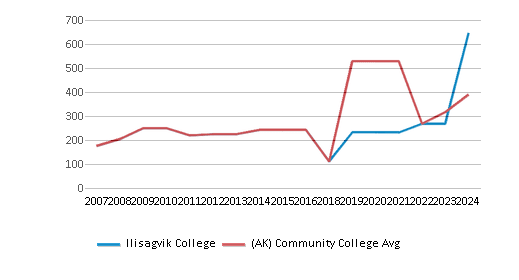
Student : Teacher Ratio
8:1
13:1
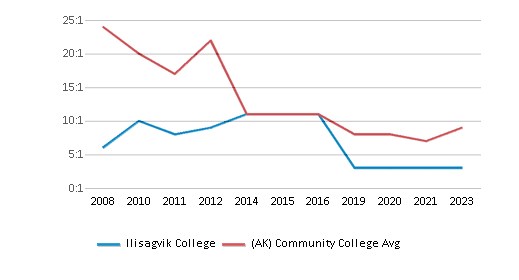
# Full-Time Students
68 students
71 students
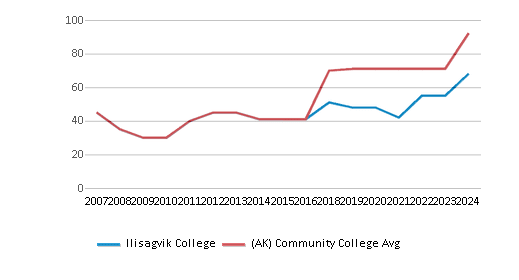
# Part-Time Students
578 students
458 students
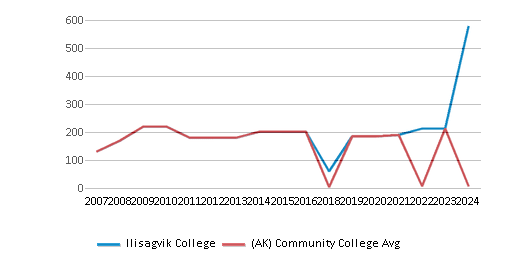
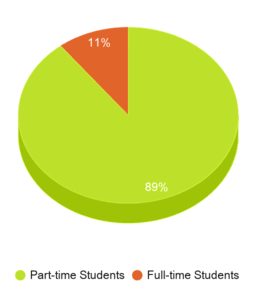
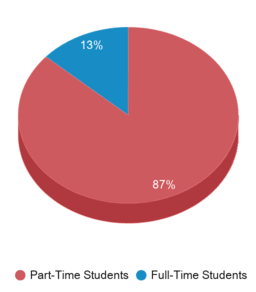
# Enrollment Undergraduate
646 students
356 students
# Full-Time Undergraduate Students
68 students
317 students
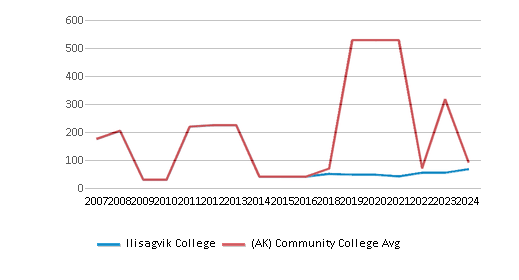
# Full-Time Graduate Students
n/a
11 students
# Part-Time Undergraduate Students
578 students
458 students
Total Dormitory Capacity
52 students
52 students
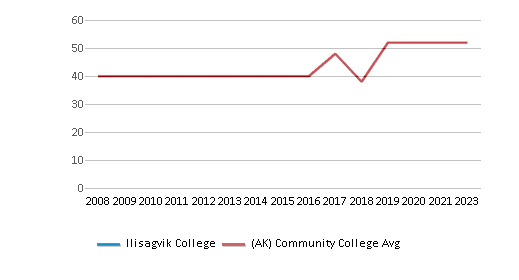
% American Indian/Alaskan
63%
20%
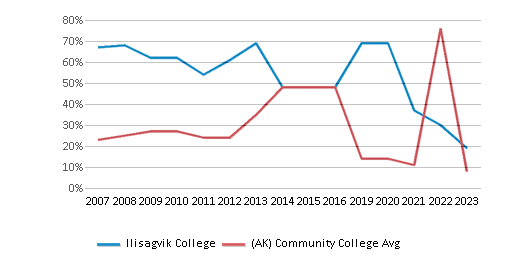
% Asian
9%
5%
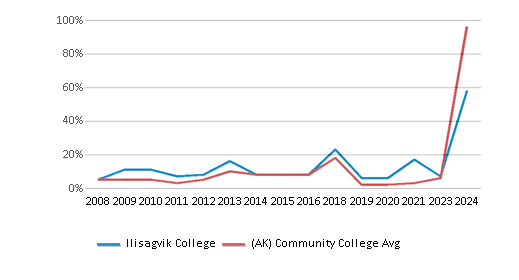
% Hispanic
1%
14%
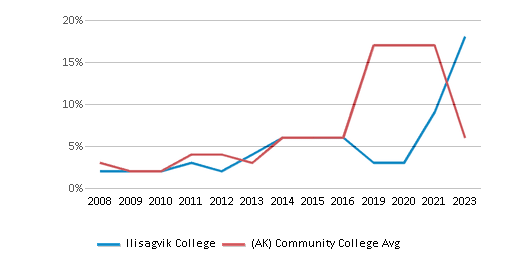
% Black
2%
7%
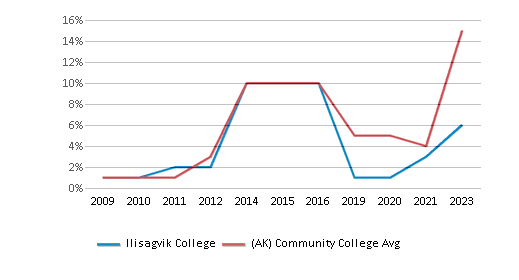
% White
8%
37%
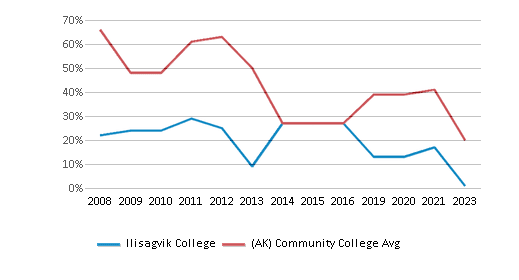
% Hawaiian
8%
6%
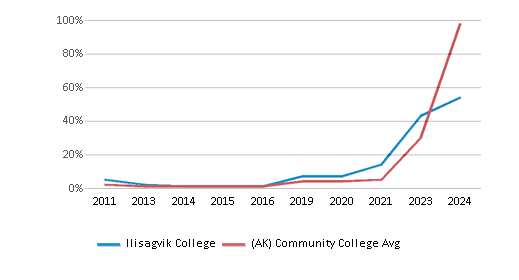
% Two or more races
n/a
6%
% Non Resident races
n/a
1%
% Unknown races
8%
4%
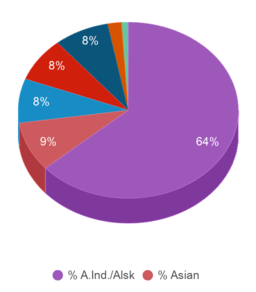
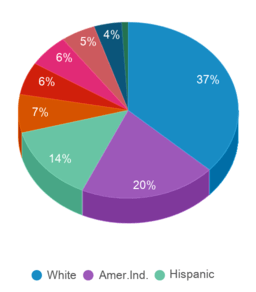
Diversity Score
0.58
0.79
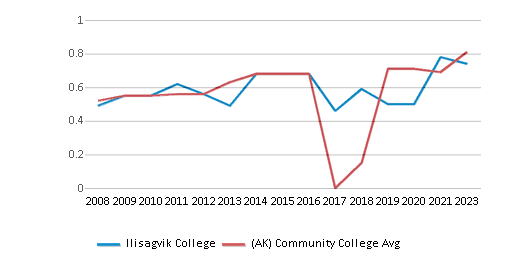
College Completion Rate (Students who graduate in less than 4 years)
23%
23%
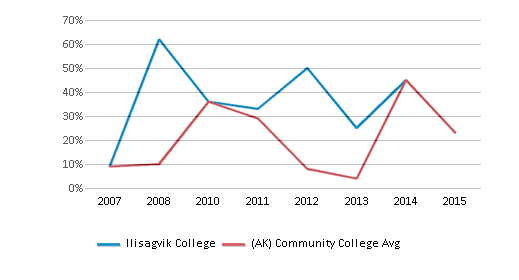
College Completion Rate (Students who graduate in 4 years or more than 4 years)
0.75%
0.5466%
Average Graduate Earnings (10 Years) (Year 2013)
$32,500
$32,500
Tuition and Acceptance Rate
The public in-state tuition of $3,340 is equal to the state average of $3,340. The in-state tuition has declined by 30% over four years.
The public out-state tuition of $3,340 is equal to the state average of $3,340. The out-state tuition has declined by 30% over four years.
In-State Tuition Fees
$3,340
$3,340
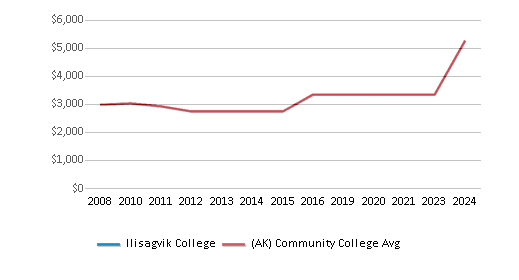
Out-State Tuition Fees
$3,340
$3,340
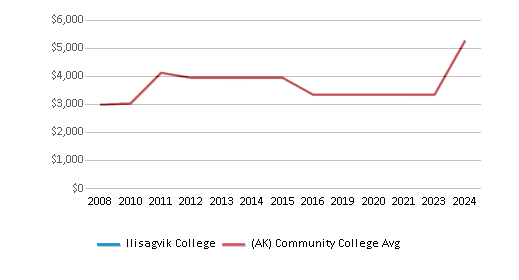
% Students Receiving Some Financial Aid
67%
67%

Median Debt for Graduates
n/a
$14,171
Median Debt for Dropouts
n/a
$6,334
Acceptance Rate
n/a
100%
Source: 2024 (or latest year available) Integrated Postsecondary Education Data System (IPEDS) , School Administrators
School Notes
- Located in the northernmost point of Alaska, Ilisagvik College is a two-year community college offering quality post-secondary academic, vocational and technical education aimed at matching workforce needs. We are dedicated to perpetuating and strengthening Inupiat (Eskimo) culture, language, values and traditions. The North Slope has undergone great changes since the establishment of the North Slope Borough in 1972. In 1986, the North Slope Borough created the North Slope Higher Education Center, a cooperative effort between the North Slope Borough and the University of Alaska Fairbanks. The North Slope Higher Education Board and the North Slope Borough Assembly changed the institution's name to Arctic Sivunmun Ilisagvik College in 1991 to reflect its development into a community college. Arctic Sivunmun Ilisagvik College merged with the Mayor's Workforce Development Program in 1994, adding facilities and resources to support the growing number of vocational education opportunities available at the college. In 1995, the North Slope Borough established by ordinance the Ilisagvik College Corporation, an independent, public, non-profit corporation of the North Slope Borough with full power for governance of the college vested in the Board of Trustees. The Ilisagvik College campus is situated at what was originally the United States Naval Arctic Research Laboratory (NARL). In 1995 this site became the newly renovated main campus for Ilisagvik College through a lease with Ukpiagvik Iupiat Corporation (UIC). The main building on campus houses the residential center, Ilisaqtuat Tukkumaviat and a full-service cafeteria. This building also contains administrative offices, student services, and instructional administration and support. Also located on the main campus is a Recreation Center for students, faculty, and staff. The Heavy Truck, Industrial Safety, Associated Construction Trades, Academic Studies, Computer and Business classes are located in renovated Quonset huts on the main campus grounds. The college offers Associate of Arts Degree, Allied Health Program, Associate of Applied Science Degree, One-Year Certificate, Endorsements, Industry Certified Training and Adult Basic Education / GED. Ilisagvik College is accredited by the Northwest Commission on Colleges and Universities (NWCCU).
Profile last updated: 01/21/2025
Frequently Asked Questions
How much does Ilisagvik College cost?
Ilisagvik College's tuition is approximately $3,340 for In-State students and $3,340 for Out-State students.
What schools are Ilisagvik College often compared to?
Ilisagvik Collegeis often viewed alongside schools like Prince William Sound Community College, Charter College by visitors of our site.
What is Ilisagvik College's ranking?
Ilisagvik College ranks among the top 20% of community college in Alaska for: Average community college minority breakdown.
Recent Articles

Obtaining Your Bachelor's Degree at a Community College
Explore the evolving landscape of community colleges offering bachelor's degrees, addressing affordability, accessibility, and workforce needs.

A to Z of Community College Certificates and Courses
From business and healthcare to technology and skilled trades, the article showcases the breadth of options available to students seeking to enhance their knowledge, develop new skills, or pursue career advancement.

What is a Community College?
This comprehensive guide explains what a community college is, its history, and its role in higher education. It covers the types of programs offered, differences from four-year colleges, benefits of attending, and important considerations for prospective students, providing valuable insights for those exploring educational options.










